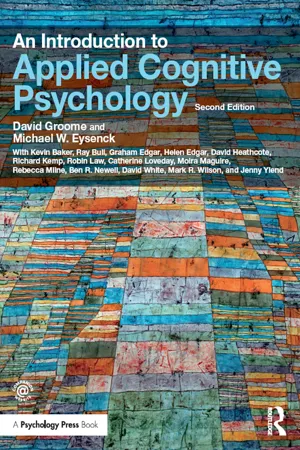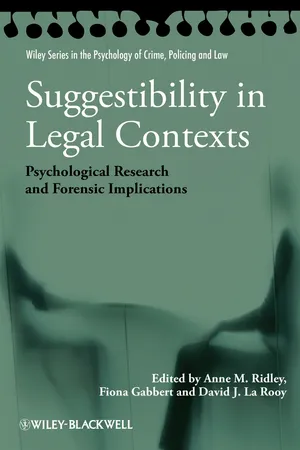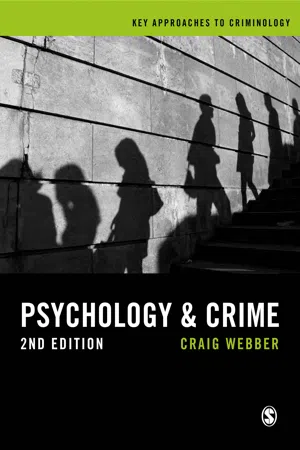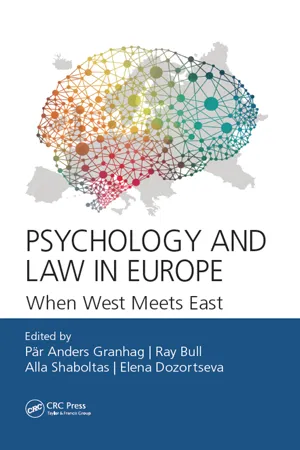Psychology
Cognitive Interview
The Cognitive Interview is a method used to enhance the retrieval of information from witnesses and victims of crimes. It involves techniques such as mental reinstatement of the context, reporting events in different orders, and recalling events from multiple perspectives. This approach aims to improve the accuracy and completeness of eyewitness testimony by tapping into the cognitive processes involved in memory retrieval.
Written by Perlego with AI-assistance
6 Key excerpts on "Cognitive Interview"
Learn about this page
Index pages curate the most relevant extracts from our library of academic textbooks. They’ve been created using an in-house natural language model (NLM), each adding context and meaning to key research topics.
- eBook - ePub
- Peter Ainsworth(Author)
- 2012(Publication Date)
- Willan(Publisher)
Chapter 6 Retrieving informationIn the previous chapter we looked at the areas of perception and memory and considered how the knowledge gained from psychology could help our understanding of these processes. It was suggested that the criminal justice system may have unrealistic expectations as to the ability of eyewitnesses to produce accurate and objective accounts of incidents that they have witnessed. Having said that it also appears that there are some techniques that can be used with witnesses to help to recover information from the memory system. In this chapter we will consider two possible ways in which witness recall might be improved, i.e. the use of the Cognitive Interview technique, and the use of investigative hypnosis.The Cognitive Interview technique (CIT)The Cognitive Interview technique provides one of the best examples of the way in which psychology and policing can be brought together productively. The technique was devised by two American psychologists, Ronald P. Fisher and R. Edward Geiselman, almost 20 years ago. Since its introduction it has undergone some modifications but has now been adopted by police forces in a number of different countries. It introduces concepts from both cognitive and social psychology and attempts to provide police officers with a range of skills and techniques that can help witnesses to remember as much detail as possible about an incidentThe importance of witness interviewingPolice forces have traditionally devoted considerable time and effort in training their officers to interview suspects, but have often failed to spend an equivalent amount of time teaching officers how to obtain information from witnesses and victims. Where training was given in respect of such interviewing, it was generally concerned with ensuring that officers produced statements that would be acceptable to the court rather than with using techniques that might aid witness recall (Stewart, 1985). Sanders (1986) reported that 98% of US police officers received no training in witness interviewing. In the UK George (1991) reported that there was considerable variation between police forces in respect of witness interviewing. However, six forces reported having no formal training and 10 offered training of less than one day. - eBook - ePub
- David Groome, Michael Eysenck(Authors)
- 2016(Publication Date)
- Psychology Press(Publisher)
Hashtroudi et al., 1994; Hope et al., 2014). However, this initially depends on how the information was elicited across the successive recall attempts. If these attempts are conducted appropriately, using predominately free-recall tasks and open-ended questions, there is less opportunity for the interviewer to influence unduly what the interviewee says. However, if the interviews involve a predominantly interviewer-driven questioning style, with large numbers of specific closed questions and leading questions, then multiple interviews can render memory increasingly less accurate and more contaminated across each recall attempt/interview (e.g. Meissner, 2002). Indeed, a good-quality first interview can help to inoculate a witness’s memory against subsequent suggestion (e.g. Memon et al., 2010b; Gabbert et al., 2012). Thus, interviewing procedures need to ensure that memory is protected as far as is possible across each recall attempt. The Cognitive Interview was a technique developed in the 1980s by two American psychologists, Ed Geiselman and Ron Fisher, in order to provide investigators with a tool to help them elicit a greater amount of accurate information from witnesses and victims of crime but without reducing the quality (i.e. accuracy) of information gained. The original CI comprised a set of four instructions given by the interviewer to the interviewee (Fisher et al., 1989), which were as follows: (i) the report everything instruction; (ii) the mental reinstatement of context; (iii) the recalling of events in a variety of different orders; (iv) the change perspective technique. Each of the four techniques was developed from extant research and theory concerning the retrieval of information from memory - eBook - ePub
Suggestibility in Legal Contexts
Psychological Research and Forensic Implications
- Anne M. Ridley, Fiona Gabbert, David J. La Rooy(Authors)
- 2012(Publication Date)
- Wiley-Blackwell(Publisher)
By contrast, the NICHD Protocol was developed primarily for use with children who are alleged victims of sexual and/or physical abuse and who are often unwilling to talk because they are scared, frightened or ashamed. There are often very long delays before interviews are conducted as a result of delayed disclosure and children are often presumed to be less credible and more suggestible. Importantly, children’s developing cognitive abilities must be considered so that we have realistic expectations of what we can expect from them in interviews. In many jurisdictions, interviews with children are electronically recorded and serve a dual purpose within the legal system: they both advance investigations by providing leads and also are often used in court, sometimes replacing live testimony. The CI and Protocol approaches to interviewing are discussed herein with emphasis on the minimization of suggestibility.ENHANCING ADULT EYEWITNESS MEMORY: THE Cognitive Interview
The Cognitive Interview (CI) was designed to improve the way police officers interviewed cooperative adult witnesses (Fisher, Geiselman, Raymond, Jurkevich, & Warhaftig, 1987). Research in the late 1980s and early 1990s examining the content and style of police interviews identified such problems as: minimal development of rapport, premature use of focused questions (including leading and/or suggestive questions) to elicit details, and frequent interruption of witness narratives and recall (Fisher, Geiselman, & Raymond, 1987; George & Clifford, 1992). Moreover, some officers interviewed witnesses in the same suggestive ways that they interviewed suspects, invoking many preconceived presumptions about case characteristics. As a result, the original aim of the CI was to improve police interviewing practices and to help witnesses provide detailed reports by incorporating strategies derived from research regarding the principles of memory and cognition. Most prominent were those relating to: (1) encoding specificity (Tulving & Thomson, 1973) which holds that maximizing the similarity between the psychological contexts in which encoding and retrieval take place is likely to enhance memory; and (2) the multicomponent view of memory encoding (Bower, 1967; Wickens, 1970), suggesting that memory traces each comprise many features, not all of which are equally accessible at any one time. For this reason, multiple retrieval attempts may allow additional details to be accessed (but see Dando, Ormerod, Wilcock, & Milne, 2011). - eBook - ePub
Psychology and Crime
A Transdisciplinary Perspective
- Craig Webber(Author)
- 2019(Publication Date)
- SAGE Publications Ltd(Publisher)
Police also overestimated the number of people who waive their Miranda rights. The police estimated this happens in as many as 81% of the interrogations whereas several studies cited by Kassin et al. have suggested the range is from 46 to 68%. However, contrary to what many commentators on American police interrogations argue, the majority, 81%, wanted the interrogation video recorded. It is often argued by the majority of police departments that this would lead to the police being unable to undertake certain interrogation techniques in case these methods would offend judges and juries. The Cognitive Interview The Cognitive Interview is a technique that incorporates cognitive retrieval techniques and context reinstatement. It begins with a period of free recall, after which the interviewer uses open-ended questions, often based on aspects of the free recall period as prompts. This is followed by an attempt to elicit the context in which the witnessed event occurred. That is attempting to evoke the environmental cues that existed at the time of the witnessed event, e.g. the location, the time, colours, smells, etc. The attempt is to provide detailed reporting and multiple retrieval, e.g. starting recall at different temporal points in the witnessed event, such as starting in the middle, end and then beginning. And finally attempting to elicit imagery and emotion (Milne and Bull 1999). Fisher and Geiselman provide a guide to the procedures that need to be followed, in Table 9.1 above. The types of question asked are also important. The CI mainly uses open questions rather than closed questions. Rather than asking for concrete facts through closed questioning, such as what weapon was used, the CI aims for a narrative. The status of the interviewer is also important. It has been found that if the witness regards the interviewer as a naïve third party they are more likely to volunteer information, even if they are not sure of its accuracy - eBook - ePub
Forensic Psychology in Context
Nordic and International Approaches
- P.A. Granhag, P.A. Granhag(Authors)
- 2017(Publication Date)
- Willan(Publisher)
Memorandum of Good Practice . London: HMSO.Dornburg, C. and McDaniel, M. A. (2006) ‘The Cognitive Interview enhances long-term free recall of older adults’, Psychology and Aging , 21: 196–200.Fahsing, I. A. and Rachlew, A. (2009) ‘Investigative interviewing in the Nordic region’, in T. Williamson, B. Milne and S. P. Savage (eds), International Developments in Investigative Interviewing . Cullompton: Willan, pp. 39–65.Fisher, R. P. (2010) ‘Interviewing cooperative witnesses’, Legal and Criminological Psychology , 15: 25–38.Fisher, R. P. and Geiselman, R. E. (1992) Memory-Enhancing Techniques in Investigative Interviewing: The Cognitive Interview. Springfield, IL: C. C. Thomas.Fisher, R. P. and York, R. M. (2009) ‘Enhancing eyewitness memory with the Cognitive Interview’, in M. St-Yves and M. Tanguay (eds), The Psychology of Criminal Investigations: The Search for the Truth . Toronto: Carswell, pp. 41–62.Fisher, R. P., Geiselman, R. E. and Amador, M. (1989) ‘Field test of the Cognitive Interview: enhancing recollection of actual victims and witnesses of crime’, Journal of Applied Psychology , 74: 722–727.Fisher, R. P., Geiselman, R. E. and Raymond, D. S. (1987) ‘Critical analysis of police interviewing techniques’, Journal of Police Science and Administration , 15: 177–185.Gabbert, F., Hope, L. and Fisher, R. P. (2009) ‘Protecting eyewitness evidence: examining the efficacy of a self-administered interview tool’, Law and Human Behavior , 33: 298–307.Garry, M. and Gerrie, M. (2005) ‘When photographs create false memories’, Current Directions in Psychological Science , 14: 321–324.Geiselman, R. E. and Fisher, R. P. (1997) ‘Ten years of Cognitive Interviewing’, in D. G. Payne and R. G. Conrad (eds), A Synthesis of Basic and Applied Approaches to Human Memory . Hillsdale, NJ: Erlbaum, pp. 291–310.Geiselman, R. E., Fisher, R. P., MacKinnon, D. P. and Holland, H. L. (1985) ‘Eyewitness memory enhancement in the police interview: cognitive retrieval mnemonics versus hypnosis’, Journal of Applied Psychology - eBook - ePub
Psychology and Law in Europe
When West Meets East
- Pär-Anders Granhag, Ray Bull, Alla Shaboltas, Elena Dozortseva, Pär-Anders Granhag, Ray Bull, Alla Shaboltas, Elena Dozortseva(Authors)
- 2016(Publication Date)
- Routledge(Publisher)
Convicted by juries, exonerated by science: Case studies in the use of DNA evidence to establish innocence after trial. NIJ Research Report NCJ 161258. Washington, DC: National Institute of Justice.Dando, C. J., Wilcock, R., & Milne, R. (2008). The Cognitive Interview: Inexperienced police officers’ perceptions of their witness/victim interviewing practices. Legal and Criminological Psychology, 13, 59–70. doi:10.1348/135532506x162498.Doherty-Sneddon, G., Bonner, L., & Bruce, V. (2001). Cognitive demands of face monitoring: Evidence for visuospatial overload. Memory & Cognition, 29, 909–919. doi:10.3758/BF03195753.Fisher, R. P. (1995). Interviewing victims and witnesses of crime. Psychology, Public Policy, & Law, 1, 732–764. doi:10.1037/1076-8971.1.4.732.Fisher, R. P., & Geiselman, R. E. (1992). Memory-enhancing techniques for investigative interviewing: The Cognitive Interview. Springfield: Charles Thomas.Fisher, R. P., & Quigley, K. L. (1992). Applying cognitive theory in public health investigations: Enhancing food recall with the Cognitive Interview. In J. M. Tanur (Ed.), Questions about questions: Inquiries into the cognitive bases of surveys. New York: Sage.Fisher, R. P., Geiselman, R. E., & Amador, M. (1989). Field test of the Cognitive Interview: Enhancing the recollection of actual victims and interviewees of crime. Journal of Applied Psychology, 74, 722–727. doi:10.1037/0021-9010.74.5.722.Fisher, R. P., Milne, R., & Bull, R. (2011). Interviewing cooperative witnesses. Current Directions in Psychological Science, 20, 16–19. doi:10.1177/0963721410396826.Fisher, R. P., McCauley, M. R., Falkner, K. L., & Trevisan, M. (2000). Adapting the Cognitive Interview to enhance long-term (35 years) recall of physical activities. Journal of Applied Psychology, 85, 180–189. doi:10.1037/0021-9010.85.2.180.FutureFact. (2012). South Africa’s big 5 social forces. Retrieved February 5, 2015, from http://www.futurefact.co.za/system/files/filedepot/4/FF%20SA%27s%20Big%205%20Forces%202012%20HIGHLIGHTS.ppsx .Gabbert, F., Hope, L., & Fisher, R. (2009). Protecting eyewitness evidence: Examining the efficacy of a self-administered interview tool. Law and Human Behavior, 33





